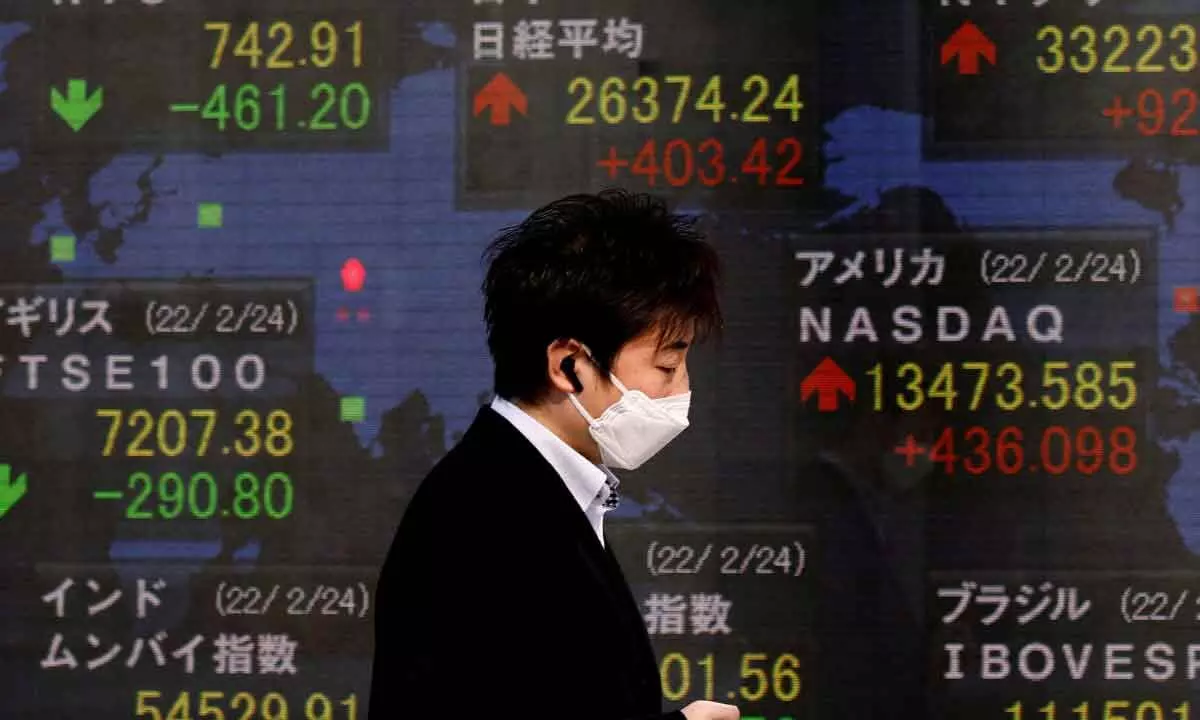Asian shares extend losses ahead of US data
Nikkei higher as investors bet on higher returns from Japanese cos, while Hang Seng, Shanghai Composite index, Kospi ended lower
image for illustrative purpose

Bangkok: Shares were mostly lower in Asia on Thursday as worries about the US economy and a possible default on US government debt pulled Wall Street lower.
Japan’s benchmark Nikkei 225 index advanced 0.4 per cent to 30,801.13, extending recent gains as investors bet on higher returns from Japanese companies. Hong Kong’s Hang Seng sank 2 per cent to 18,739.03 as investors fretted over the trajectory for China’s economic recovery after the government relaxed pandemic restrictions late last year. The Shanghai Composite index also fell, by 0.5 per cent to 3,188.34. Simmering tensions between China and the United States over technology and security have added to uncertainties. In Seoul, the Kospi shed 0.5 per cent to 2,554.69, while Australia’s S&P/ASX 200 gave up 1.1 per cent to 7,138.20. India’s Sensex declined 0.2 per cent. Taiwan’s benchmark Taiex jumped 0.8 per cent on gains for major computer chip makers. Taiwan Semiconductor Manufacturing Co, the world’s largest, surged 3.4 per cent.
On Wednesday, the S&P 500 lost 0.7 per cent after House Speaker Kevin McCarthy said Republicans and Democrats remain far apart in talks on raising the debt ceiling to prevent a potentially disastrous default on the US government’s debt. The main US stock index is on track for its worst week in more than two months as the once-unthinkable creeps closer to possibility. Minutes from the Federal Reserve’s latest meeting showed policy makers are split on whether to keep raising interest rates. The US government could run out of cash to pay its bills as soon as June 1 unless Congress allows it to borrow more. The widespread belief on Wall Street is that Congress will come to an agreement at the 11th hour, as it’s done several times before, because a default would benefit no one and could cause tremendous disruptions to the economy and financial markets.
“As the early-June deadline ticks closer, only a concrete resolution may provide the much-needed conviction for markets rather than verbal reassurances, with the lingering risks of a continued impasse still keeping sentiments on a cautious tone,” Yeap Jun Rong of IG said in a commentary.
All told, the S&P 500 fell 30.34 to 4,115.24. The Dow Jones Industrial Average dropped 0.8 per cent to 32,799.92, while the Nasdaq composite lost 0.6 per cent to 12,484.16. The stock market has remained mostly resilient despite the worries. Fear has so far been concentrated in the bond market, where prices have dropped for Treasury bills due to pay out around the date of a possible default.
The yield on the 10-year Treasury rose to 3.73 per cent from 3.70 per cent late Tuesday. It helps set rates for mortgages and other important loans. The yield on the two-year Treasury, which moves more on expectations for Fed action, rose to 4.37 per cent from 4.33 per cent. Interest rates are so high because the Federal Reserve has yanked them up at the fastest pace in decades to try to bring inflation under control. Traders are hopeful just one more hike may be on the way this summer, if any at all. Federal Reserve officials were divided earlier this month on whether to pause their rate hikes at their upcoming meeting in June, according to the minutes of their latest meeting. Helping to limit Wall Street's losses were several companies that reported stronger results for the start of the year than analyst expected.
Kohl's jumped 7.5 per cent after reporting a surprise profit for its latest quarter, helped in part by momentum at its Sephora beauty shops. Analysts had expected it to turn in a loss. Resilient spending by US consumers has helped to fend off a recession even as manufacturing and other areas struggle with higher interest rates. Homebuilder Toll Brothers rose 2.1 per cent after reporting much better results than analysts expected for the latest quarter.
In other trading Thursday, benchmark US crude oil dropped 38 cents to $73.96 per barrel in electronic trading on the New York Mercantile Exchange. It gained $1.43 on Wednesday, to $74.34 per barrel. Brent crude, the standard for international trading, slipped 28 cents to $77.95 per barrel. The US dollar rose to 139.56 Japanese yen from 139.41 yen. The euro fell to $1.0740 from $1.0754.

